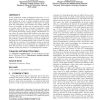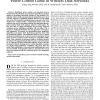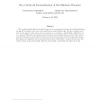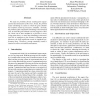294 search results - page 37 / 59 » The complexity of computing a Nash equilibrium |
104
click to vote
SIGECOM
2010
ACM
15 years 1 months ago
2010
ACM
In the traditional voting manipulation literature, it is assumed that a group of manipulators jointly misrepresent their preferences to get a certain candidate elected, while the ...
111
click to vote
TON
2008
15 years 1 months ago
2008
Distributed power control is an important issue in wireless networks. Recently, noncooperative game theory has been applied to investigate interesting solutions to this problem. Th...
134
click to vote
ICALP
2009
Springer
16 years 1 months ago
2009
Springer
We consider graphical games in which edges are zero-sum games between the endpoints/players; the payoff of a player is the sum of the payoffs from each incident edge. We give a si...
123
click to vote
CCGRID
2007
IEEE
15 years 7 months ago
2007
IEEE
We study two problems directly resulting from organizational decentralization of the Grid. Firstly, the problem of fair scheduling in systems in which the grid scheduler has compl...
117
click to vote
IPPS
2002
IEEE
15 years 6 months ago
2002
IEEE
In this paper we present a game theoretic framework for obtaining a user-optimal load balancing scheme in heterogeneous distributed systems. We formulate the static load balancing...




